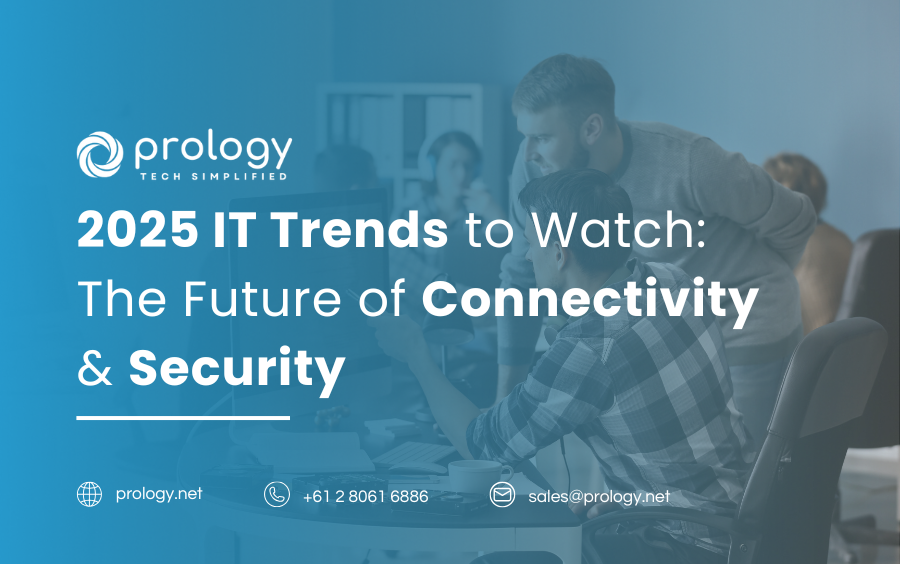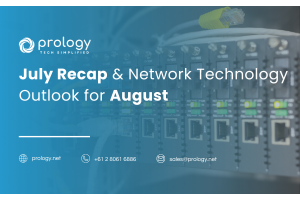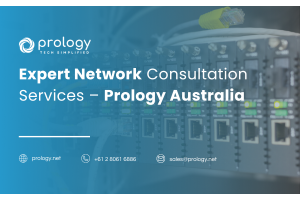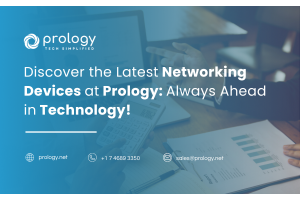2025 IT Trends to Watch: The Future of Connectivity & Security

The year 2025 is ushering in a new era for information technology, with important trends such as the expansion of 5G, quantum computing, advanced artificial intelligence, and Zero Trust security models. These advances not only promise to improve connectivity speeds and data protection, but also pose many challenges for businesses in terms of investment, security and compliance. As a leading provider of network equipment in Australia, Prology is committed to providing the most advanced solutions, helping your business be ready to meet all the connectivity and security requirements of the new era. Follow Prology to update the leading network solutions and prepare for the future!
1. Introduction
In recent years, information technology has made great strides, from the deployment of 5G networks, the application of artificial intelligence (AI) to the rise of the Internet of Things (IoT). These innovations have significantly improved connection speeds, enhanced security, and supported large-scale automation. 2025 is expected to be a turning point with new technologies that not only enhance connectivity but also create a more solid security foundation in the digital environment.
With the explosion of smart devices, from homes to businesses, the need for continuous connectivity and strong security is becoming a top priority. Trends such as 5G+, quantum computing, and the Zero Trust security model not only bring many benefits but also open up challenges in ensuring data security and managing complex network systems. Therefore, understanding information technology trends will be the key for businesses to seize opportunities and minimize risks.
This article will help you explore in detail the prominent IT trends in 2025, the benefits they bring as well as the challenges that come with them. From there, you will have a comprehensive view of how new technologies will affect life and work, as well as how Prology - a leading network equipment provider in Australia - supports businesses to adapt to the constant changes in the field of connectivity and security.

2. IT Trends 2025
2025 will be a breakthrough year with leading information technology trends, shaping the development landscape of connectivity and security in areas from business to life. Advanced technologies not only improve speed and performance but also meet increasing security needs. These trends will be important tools for businesses to innovate and maintain a competitive position. Below are the prominent IT trends that every business should follow to prepare for the digital future:
-
5G and 5G+ networks expand
5G and its successor, 5G+, will usher in a whole new era of connectivity with speeds many times faster than 4G. This will improve the user experience with high-speed applications such as augmented reality (AR), virtual reality (VR), and real-time data transmission. The widespread deployment of 5G+ promises to change the way we work and live, from intelligent transportation systems to automated manufacturing.

-
Quantum Computing
Quantum computing offers enormous potential to solve complex problems that conventional computers cannot handle. With the ability to quickly process billions of calculations in a short time, quantum computing will advance fields such as finance, healthcare, and even national security. However, the implementation and security of this technology remains a major challenge, requiring extensive investment and research.

-
Advanced Artificial Intelligence (AI) and Machine Learning
AI and machine learning will continue to grow in their ability to analyze data and automate processes, delivering real value to businesses. In 2025, AI will not only help personalize customer experiences but also improve forecasting and decision-making. Advanced AI systems will help reduce errors in complex processes, increase accuracy, and optimize operations in industries such as finance, retail, and manufacturing.

-
Zero Trust Security
The Zero Trust security model is becoming the new standard for protecting networks against increasingly sophisticated threats. With the principle of "trust no one" and requiring strict authentication for all access, Zero Trust ensures that business and user data are protected at the highest level. Especially in the context of widespread remote work, Zero Trust helps minimize the risk of cyberattacks and security vulnerabilities.

-
Internet of Things (IoT) and Edge Computing
As the number of IoT devices increases rapidly, edge computing will play a key role in processing and analyzing data on-site instead of sending it to a data center, improving speed and reducing latency. IoT combined with edge computing will help businesses make faster decisions and optimize workflows, from supply chain management to security monitoring. This will be the foundation for smart applications in healthcare, manufacturing, and transportation.

These IT trends bring both benefits and challenges. Understanding the development of these technologies will be the key to helping businesses not only adapt to change but also maximize the value of advanced connectivity and security solutions. Let's update and prepare with Prology - a leading network equipment provider in Australia - to take advantage of the opportunities from IT technology trends 2025!
3. Notable IT Trends
The year 2025 will witness the rapid development of important technologies, changing the way businesses operate and enhancing the user experience. Each of these technology trends brings practical benefits, but also comes with many challenges in the implementation and management process. Below is a detailed analysis of some prominent IT trends expected to shape the future of connectivity and security, helping businesses and users understand the potential and limitations of each technology.
-
5G and Beyond
Benefits: 5G and its enhanced versions will deliver much faster data speeds, virtually eliminating latency, which is especially important for real-time applications such as virtual reality (VR), augmented reality (AR), and smart manufacturing. This will not only provide a smoother user experience, but also enable businesses to optimize operations, from supply chain management to manufacturing automation.
Challenges: To fully realize the potential of 5G, businesses will need to invest heavily in network infrastructure, especially in ensuring data security and privacy. The cost and engineering required to upgrade the system, as well as privacy-related regulations, will be major barriers to deployment.
"Follow us for more industry insights on the future of connectivity!"
-
Quantum Computing
Benefits: Quantum computing represents a major leap forward in data processing capabilities, helping solve complex problems that traditional computers cannot. In industries such as finance, pharmaceuticals, and cybersecurity, quantum computing will bring significant efficiencies, shortening analysis and prediction times, and increasing the efficiency of product research and development.
Challenges: Investing in quantum computing is costly, as well as requiring high technical expertise. Businesses must prepare resources for training and development, while also facing challenges in security and management of quantum data, which are much more complex than traditional systems.
"Comment with your thoughts on how quantum computing might transform industries!"
-
Advanced AI and Machine Learning
Benefits: AI and Machine Learning continue to deliver rapid data analytics, predictive support, personalization, and process automation, helping businesses enhance customer experiences and improve operational efficiency. Advanced AI systems will help businesses make faster, more accurate decisions and optimize costs in the long term.
Challenges: With the development of AI, data security becomes a key issue. Businesses need to build stronger security infrastructures to protect data, while addressing ethical and privacy concerns as AI becomes more deeply involved in business operations.
"Stay updated with us on the latest advancements in AI!"
-
Zero Trust Security
Benefits: The Zero Trust security model offers a more secure approach that requires strict authentication for all access, thereby minimizing the risk of intrusion and data leakage. With Zero Trust, businesses can be more confident in protecting sensitive information, especially in the context of remote work and the increasing number of connected devices.
Challenges: Implementing and maintaining Zero Trust requires high costs and adjustments in corporate culture, from awareness to workflow. This is a process that requires time, effort, and continuous monitoring to meet the highest security standards.
"Learn more about Zero Trust! Follow for updates!"
-
IoT and Edge Computing
Benefits: The combination of IoT and edge computing allows businesses to process and analyze data at the point of connection, rather than having to transfer it to a data center. This reduces latency, makes decisions faster, and improves overall performance. IoT and edge computing applications have strong potential in areas such as healthcare, transportation, and industry, where instantaneous decision making can deliver great value.
Challenges: Along with the benefits come security risks. The growing number of connected IoT devices creates new security vulnerabilities, requiring businesses to invest in robust data management and monitoring systems to ensure safety.
"Share your insights on how IoT will shape industries in 2025!"
These IT trends promise to create a breakthrough for the technology industry in 2025. To catch the new wave of technology, businesses need to prepare carefully, clearly understand the benefits and challenges that each trend brings. Follow Prology - a leading network equipment provider in Australia - to track and grasp the outstanding technology trends to be ready for the digital future!
4. Common Benefits and Challenges of Technology Trends in 2025
In the context of strong digital transformation, technology trends in 2025 promise to bring many great benefits to businesses and end users. However, there are many challenges that require businesses to have appropriate strategies and resources to exploit the full potential of new technology. Below is a summary of the common benefits and challenges when applying IT technology trends in the coming year.
Benefits of technology trends in 2025
- Increase Efficiency and Productivity
Technologies such as 5G+, AI, and IoT will help automate complex processes, reduce errors, and improve operational efficiency. Businesses can optimize production processes, increase response speed, and improve decision-making.
- Reduce operating costs
Applying AI and Machine Learning helps businesses better forecast, optimize resources and minimize waste. Quantum computing and edge computing also enable rapid data processing, helping to save on long-term operating costs.
- Improve customer experience
Advanced technologies such as AI, 5G, and IoT help businesses provide personalized services, respond quickly to customer needs, and deliver smooth experiences. The ability to analyze real-time data allows businesses to better understand customer needs, thereby building more effective outreach strategies.
- Enhance information security and safety
Zero Trust security model and AI-based security solutions help businesses protect data from sophisticated cyber attacks. This is a key factor in protecting users' privacy and personal data, especially in remote working environments and increasingly popular IoT devices.
Challenges of technology trends in 2025
- Security and privacy risks
As the number of IoT devices increases, along with the expansion of 5G networks and edge computing, security vulnerabilities become increasingly complex. Maintaining security for distributed systems becomes more difficult, requiring businesses to continuously monitor and update systems to prevent cyber attacks.
- Large investment costs
Deploying advanced technologies such as quantum computing, 5G+ or Zero Trust security systems requires high investment costs from infrastructure to human resources. Small and medium-sized businesses may have difficulty keeping up with new technology due to limited financial resources.
- Shortage of skilled human resources
New technologies require specialized skills and continuously updated knowledge. However, the current labor market still lacks experts with sufficient knowledge of AI, quantum computing, and security. This makes recruitment and training a big challenge for businesses.
- Business adaptability
Applying new technology may require businesses to change their organizational structure, work culture, and operating processes. This requires flexibility and commitment from leadership as well as all employees, a significant challenge when businesses expand their scale or reform their operations.
As we enter 2025, applying new technology trends can bring great value, but businesses need to carefully evaluate the benefits and costs to make appropriate strategic decisions. Together with Prology - the leading network equipment supplier in Australia - grasp and face this challenge to achieve sustainable
5. The importance of preparing for 2025 technology trends
As we move into 2025, preparing for technology trends becomes extremely important for both businesses and individuals. The rapid development of technology not only brings new opportunities but also creates challenges that we need to face. To succeed in this context, businesses and individuals need to make strategic preparations, equip themselves with appropriate skills and tools to take full advantage of the potential from new technologies.
Guide businesses and individuals on how to prepare to stay ahead of the trend
- Evaluate and analyze the current situation
Businesses need to start by assessing the current state of their technology, from infrastructure to workflow. This helps identify strengths, weaknesses and opportunities for improvement. Individuals should also self-assess their technology skills, identifying areas that need to be enhanced or updated.
- Invest in training and skills development
To adapt to new technology trends, investing in training is essential. Businesses should organize training programs for employees on technologies such as AI, quantum computing, and security. At the same time, individuals need to proactively seek out online courses, seminars, and learning resources to enhance their knowledge and skills.
- Use modern tools and software
The application of advanced tools and software enhances the ability to work effectively. Businesses should consider using cloud solutions, project management software, and data analytics platforms to improve workflows and optimize operations. Individuals can also apply online learning tools and applications to grasp new knowledge.
- Create a flexible and innovative working environment
To respond to rapid changes in technology, businesses need to create a flexible working environment that encourages creativity and innovation. There needs to be a mechanism to encourage employees to propose new ideas and initiatives, to help them feel engaged and develop their creativity.
- Build a long-term technology strategy
Businesses should build a clear technology strategy, identify specific goals and implementation roadmap. This plan should be updated regularly to reflect changes in technology and markets. Individuals should also determine their career goals and skill development directions according to technology trends.
- Join the tech community
Businesses and individuals should actively participate in seminars, technology events and specialized forums. This not only helps expand your network but also provides the opportunity to learn from leaders in the technology field. This connection can help businesses develop new ideas and receive valuable feedback from other experts.
6. Conclude
Preparing for the technology trends of 2025 is not just an option but a necessity to survive and thrive in the digital age. Businesses and individuals need to act today to ensure that they can not only face but also exploit the opportunities that new technologies bring. By collaborating with industry experts like Prology – a leading network equipment provider in Australia, businesses can develop effective and sustainable technology strategies for the future!
2025 promises to be an explosive period for technology trends, with breakthrough advances in 5G and Beyond, quantum computing, advanced AI and Machine Learning, Zero Trust security models, as well as IoT and edge computing. Each trend not only brings great benefits such as increased performance, improved customer experience and reduced costs, but also faces significant challenges such as security risks and high investment costs.
To succeed in this technological era, businesses and individuals need to stay informed, stay abreast of new trends, and be prepared to adapt to change. Continuous learning and expanding our skills will help us not only face but also seize the great opportunities that technology brings. Stay up to date with the latest industry news and be prepared for new challenges and opportunities!
- "Follow us for more insights on emerging tech trends!"
- "Which 2025 trend do you think will have the biggest impact? Share your thoughts in the comments!"








